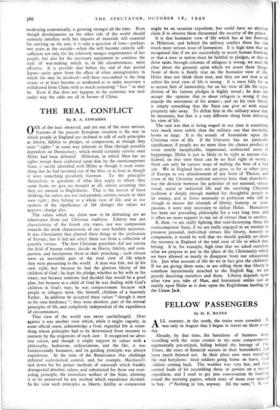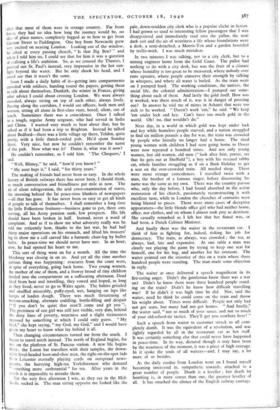FELLOW PASSENGERS
By H. E. BATES ALL summer, in the south, the trains were crowded. It was only in August that I began to travel on them every day.
Already, by that time, the battalions of business men, travelling with the same cronies in the same compartments. regimentally pin-striped, hiding behind the barrage of The Times, the roses of financial success in their buttonholes, had been much thinned out. In their place now were travelling the real battalions: tired soldiers going home on leave, tired soldiers coming back. The weather was very hot, and they carried loads of kit resembling those of porters on a tourist expedition, and I used to get into conversation by handing round the morning papers, which none of them ever seemed to buy. (" Nothing in 'em, anyway. All the same.") It was dear that most of them were in strange country. Far from home, they had no idea how long the journey would be, no idea of place names, completely fogged as to how to get from Cannon Street to Paddington. One boy from Newcastle grew very excited on nearing London. Looking out of the window, he asked at every passing church, " Is that Big Ben? " and when I told him no, I could see that for him it was a question of realising a life's ambition. So, as we crossed the Thames, I pointed out St. Paul's instead, very impressive in the hot sun- light beyond the water. But he only shook his head, and I could see that it wasn't the same.
Soon I made a daily habit of it—getting into compartments crowded with soldiers, handing round the papers, getting them to talk about themselves, Dunkirk, the winter in France, giving what advice I could about crossing London. We were always crowded, always sitting on top of each other, always lively. Passing along the corridors, I would see officers, both men and women, sitting all alone in first-class state, bored, silent, out of touch. Sometimes there was a coincidence. Once I talked to a tough, regular Army sergeant, who had served in India and China. I wanted very much to hear about that, but he talked as if it had been a trip to Brighton. Instead he talked about Bedford—there was a little village up there, Yelden, quite pretty, with a little thatch-roofed pub. He'd spent Sunday there. Very nice, but now he couldn't remember the name of the pub. Now what was it? Damn it, what was it now?
He couldn't remember, so I told him. ' The Chequers,' I said.
" Well, Blimey," he said, " how'd you know? "
" My aunt kept it," I said, " for thirty years."
The making of friends had never been so easy. In the whole history of British railways there has never been, I should think, so much conversation and friendliness per mile as now. The air of silent refrigeration, the arid cross-examination of stares, the snoozing behind the fat peace-time blankets of newspapers —all that has gone. It has never been so easy to get all kinds of people to talk of themselves. I shall remember a long time the little Folkestone fruiterer—business gone to pot, three sons serving, all his Army pension sunk, few prospects. His life should have been broken in half. Instead, never a word of complaint. And as if to show me what adversity really was he told me reticently how, thanks to the last war, he had had thirty major operations on his stomach, and lifted his trousers' leg to show me a calf carved like a fantastic chair-leg by bullet holes. In peace-time we should never have met. In an hour, now, he had opened his heart to me.
This sort of thing went on for a month. All the time the blitzkrieg was closing in on us. And yet all the time another curious thing was happening: evacuees from the coast were, in spite of everything, going back home. Two young women, the mother of one of them, and a frowsy brood of tiny children herded into the compartment on a suffocating afternoon. Dead tired from heat and travelling, they vowed and hoped, as long as they lived, never to go to Wales again. The babies grizzled and snuffled miserably, puffy-eyed, wet, hanging on laps like lumps of leaden dough. There was much threatening of bottom-smacking, alternate coddling, bottle-filling and despair (" If you don't be quiet that man'll come and git you "). The prettiness of one girl was still just visible, very dim, behind the dirty lines of poverty, weariness and a slight viciousness imposed by something at which I could only guess. " My God," she kept saying, " my God, my God," and I would have given my heart to know what lay behind it all.
Then changing circumstances turned me from the south. I began to travel north instead. The north of England begins, for me. on the platform of St. Pancras station. A new life begins there: the Luton hat travellers with their samples, the down- right level-headed boot-and-shoe men, the right-on-the-spot lads ft It Leicester eternally playing cards on outspread news- Trs, the hurrying high-tea Yorkshiremen who demand maething more soobstantial " for tea. After years in the th it is impossible to mistake them.
Yet the very first afternoon I was, as they say in the Mid- lands, sucked in. .The man sitting opposite me looked like the pale, down-trodden city clerk who is a popular cliché in fiction. I had grown so used to interesting fellow passengers that I was disappointed and immediately read into the pallor, the neat dark suit and the air of weariness a life whose foundations were a desk, a semi-detached, a Morris-Ten and a garden bounded by trellis-work. I was much mistaken.
In two minutes I was talking, not to a city clerk, but to a mining engineer home from the Gold Coast. The pallor had nothing to do with a city desk, but was the fruit of a climate whose humidity is too great to be measured, where nobody ever runs upstairs, where people conserve their strength by talking in whispers, and where all water is boiled. As the train went on I pumped hard. The working conditions, the natives, the social life, the colonial administration—I pumped out some- thing about each of them. And lastly the gold itself. How was it worked, was there much of it, was it in danger of petering out? In answer he told me of mines in Ashanti that were too rich to be worked. " Daren't work 'em," he said. " We keep 'em under lock and key. Can't have too much gold in the world. Oh! no, that wouldn't do."
Next day, in a world in which gold was kept under lock and key while homeless people starved, and a nation struggled to find six million pounds a day for war, the train was crowded by people who literally no longer had a home. The tired young women with children I had seen going home to Dover were now repeated a hundred times. And not only young women, but old women, old men (" look after him, porter, see that he gets out at Sheffield "), a boy with his rescued tabby cat, whole families struggling as if on a Bank Holiday to get a seat on the over-crowded train. All needed sleep. There were more strange coincidences. I travelled twice with a man, the brother of a famous singer, before discovering his name was the same as my own. There was the country parson who, only the day before, I had found absorbed in the active restoration of his church, passionately reconstructing it with excellent taste, while in London the churches of centuries were being blasted to pieces. There were more cases of deceptive appearances—the little blonde office girl who had neither home, office, nor clothes, and on whom I almost took pity as destitute. She casually remarked as I left her that her fiancé was, or had been, a Dutch Cabinet Minister.
And finally there was the waiter in the restaurant car. I think of him as fighting for, indeed, risking his job for democracy. The train, as always, was crowded ; the tea, as always, bad, late and expensive. At one table a man was clearly not playing the game by trying to keep one seat for himself, one for his bag, and another for his overcoat. The waiter pointed out the injustice of this on a train where three hundred people were standing. The man made some objection in reply.
The waiter at once delivered a speech magnificent in its fire-eating anger. Didn't the gentleman know there was a war on? Didn't he know there were three hundred people stand- ing on the train? Didn't he know how difficult travelling was? If he didn't it was high time he did. Nor, said the waiter, need he think he could come on the train and throw his weight about. Times were difficult. People not only had not got seats, but many had not got homes. " And finally," the waiter said, " not so much of your sauce, and not so much of your old-school-tie tactics. They'll get you nowhere here! "
Such a speech from waiter to customer struck us all com- pletely dumb. It was the equivalent of a revolution, and was rightly regarded by all in the restaurant car as hot stuff. It was certainly something else that could never have happened in peace-time. In its way, dictated though it may have been by the weariness of the moment, it was a piece of high courage. In it spoke the souls of all waiters—and, I may say, a lot more of us besides.
As the daily exodus from London went on I found myself becoming interested in, sympathetic towards, attached to a great number of people. Death is a leveller ; but death by bombing is, in more senses than one, the greatest leveller of all. It has smashed the silence of the English railway carriage.































 Previous page
Previous page